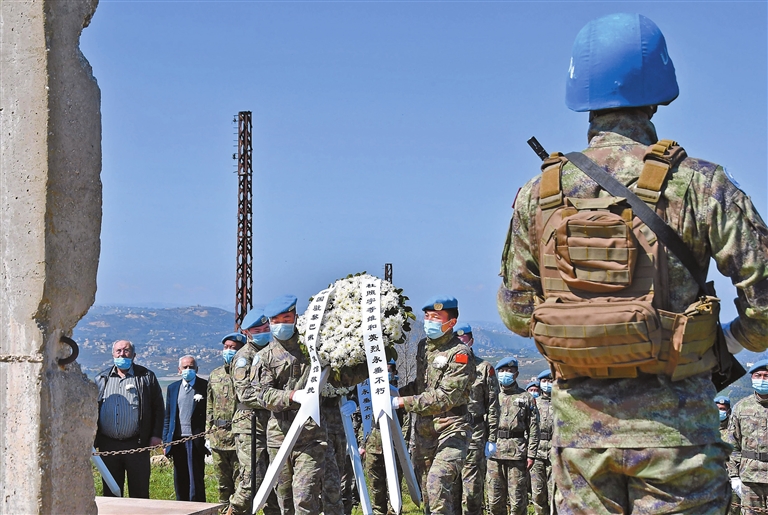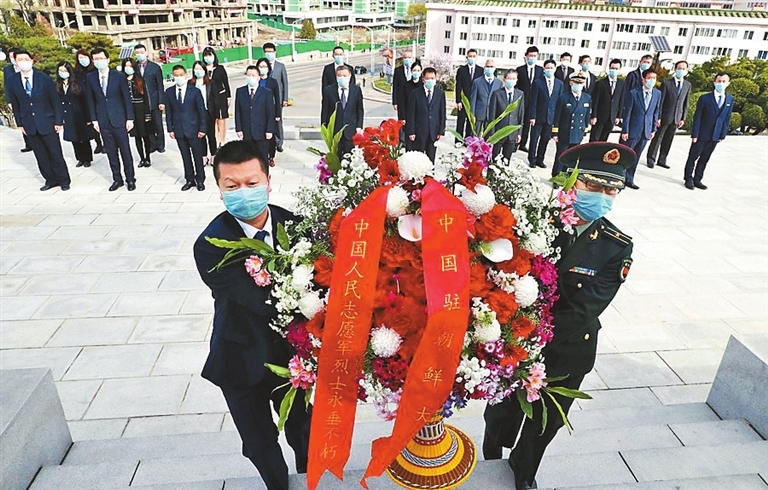

THE Tomb-sweeping Day, also known as Qingming Festival, is a traditional Chinese festival for people to sweep tombs to mourn the deceased and worship their ancestors and the martyrs. Ahead of this year’s Tomb-sweeping Day, which falls on Sunday, overseas Chinese as well as local people have expressed in various ways their admiration for the fallen heroes from China, who sacrificed their lives on foreign lands for the cause of safeguarding world peace and promoting global development. During his visit to the Democratic People’s Republic of Korea (DPRK) in June 2019, Chinese President Xi Jinping paid homage to the martyrs of the Chinese People’s Volunteers (CPV) at the China-DPRK Friendship Tower, which stands at the foot of Moran Hill in downtown Pyongyang. Xi said the tribute paid to the tower demonstrates the firm determination of China and the DPRK to maintain peace. In June 1950, eight months after the founding of the People’s Republic of China, the Korean War broke out. In order to deter the invasion and expansion of imperialism, safeguard the security of China, stabilize the situation on the Korean Peninsula and uphold peace in Asia and the world, in October 1950, as requested by the DPRK, the CPV forces crossed the Yalu River to aid the DPRK until a truce was signed in 1953. During the War to Resist U.S. Aggression and Aid Korea, a total of 2.9 million CPV soldiers fought on the battlefield, 197,653 of whom sacrificed their lives. “Numerous CPV soldiers lost their lives on this land. The victory has not only safeguarded the security of new China and the DPRK, but also made great contributions to world peace and human progress,” Sai Tiejun, chairman of the Central Committee of the Federation of Overseas Chinese in the DPRK, told Xinhua ahead of the Tomb-sweeping Day. “The Chinese people love peace and oppose war. This is the precious wealth left to us by the martyrs of CPV soldiers,” said Li Yuanfu, whose father participated in the war and chose to live in the DPRK after the war to promote China-DPRK friendship. “More than 70 years have passed. The China-DPRK friendship is deeply rooted in the hearts of the two peoples. We must inherit and carry forward the great spirit of the CPV martyrs, and continue to make contributions to the China-DPRK friendship,” Li said. Dedication to common prosperity In the 1970s, more than 50,000 Chinese engineers, technicians and workers traveled to Africa and worked side by side with the Tanzanian people to build the Tanzania-Zambia Railway (TAZARA) under extremely difficult conditions. During the construction of the railway, which has been called a “road of freedom” and “road of friendship,” more than 60 Chinese experts have sacrificed their lives. In March 2013, during his visit to Tanzania, Xi visited a cemetery containing the remains of the Chinese experts who had lost their lives in the East African country. They interpreted the great spirit of internationalism with their lives, and, just as TAZARA, they will be remembered by both the Chinese and Tanzanians, Xi said. Having transported millions of tons of goods and innumerable passengers since it was put into operation, the Tanzania-Zambia Railway has greatly contributed to Africa’s prosperity. “We Tanzanians will never forget the Chinese-built Tanzania-Zambia Railway in the 1970s, when dozens of Chinese engineers sacrificed their lives in the endeavors to help their African brothers develop their infrastructure and economy,” said Julius Augustino, an employee of the China Civil Engineering Construction Corporation. The Tanzania-Zambia Railway epitomizes the pragmatic cooperation and long-standing friendship between China and Africa. From assisting African nations in constructing roads, railways, airports and ports, to launching projects to improve local people’s living standards, China has adhered to the principles of sincerity, real results, amity and good faith in its cooperation with Africa. “A friend in need is a friend indeed. Africa, including Tanzania, has benefited a lot from Chinese aid over the years, which focuses not only on economic development, but also people’s well-being,” said Augustino. Chinese ‘Blue Helmets’ Committed to safeguarding world peace, China has also played an active role in the United Nations’ (U.N.) peacekeeping operations around the world, making tremendous contributions to facilitating the peaceful settlement of disputes and safeguarding regional security and stability. It is the second-largest contributor to the U.N. peacekeeping budget and the largest troop-contributing country among the permanent members of the U.N. Security Council. China’s armed forces have sent over 40,000 peacekeepers to U.N. peacekeeping missions over the past 30 years, and Chinese peacekeepers have left their footprints in over 20 countries and regions, according to a white paper released by China last year. Moreover, by sending engineering and medical units to support the U.N. operations, China has also promoted economic and social development in the host nations. During the peacekeeping missions, 16 Chinese service personnel sacrificed their lives and the fallen heroes’ names have been listed in the white paper to commemorate them. Among them is Du Zhaoyu, who was killed during a plane bombing in Lebanon in July 2006, after serving eight months as a U.N. observer in the Middle East. “Du had held fast to his mission and defended peace on this land until the last moment of his life,” said Lyu Fushun, a member of the 19th batch of Chinese peacekeeping forces to Lebanon. “Today, the Chinese peacekeepers continue to commit themselves to the mission (of maintaining peace). We have also helped local people build their homes and restore production, and provided them with supplies and medical assistance,” Lyu said. Grateful to the Chinese peacekeepers, Mahmoud Mehanna, an employee of the U.N. Interim Force in Lebanon, said, “I have witnessed the contributions and even sacrifices made by Chinese peacekeepers to Lebanon.” Besides dangerous tasks such as mine clearance and explosive disposal, “they have also helped us build schools, repair office buildings, offer medical treatment for free and repair living facilities,” Mehanna said ahead of the Tomb-sweeping Day. “They are the most lovely Oriental friends of our people in Lebanon.” (Xinhua) | 
